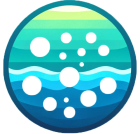Chlorine tablets are well-known for their potent antibacterial properties, and their use extends far beyond just disinfecting swimming pools. Due to their wide range of applications, chlorine tablets are a valuable component in everyday life, playing a significant role in maintaining people’s health and safety. This article discusses the various uses of chlorine tablets, particularly in the treatment of recreational water, as well as their dominance in other unexpected areas. From ensuring safe drinking water to maintaining household hygiene, the functions of chlorine tablets have surpassed the boundaries of pools.
Chlorine tablets are disinfectants primarily composed of chlorinated compounds like sodium hypochlorite and calcium hypochlorite. They have a broad-spectrum antibacterial effect and are widely used in home, medical, and water treatment applications.

Here are the main functions of chlorine tablets:
Antibacterial Effect
Chlorine tablets can quickly kill bacteria, viruses, and fungi in the air, effectively disinfecting the air and preventing the spread of infectious diseases. In hospitals, chlorine-based agents are extensively used in operating rooms, wards, and diagnostic rooms to protect patients’ health.
Water Treatment
Chlorine tablets are key to water treatment. They effectively kill bacteria, parasites, and viruses in water, ensuring the hygiene and safety of drinking water. Many countries and regions have applied chlorine tablets in residential and central water supply systems.
Food Sterilization
Chlorinated disinfectants are widely used in food sterilization. Bacteria and viruses in food pose a serious threat to human health, and chlorine tablets can effectively kill microorganisms contaminated in food. For instance, chlorine tablets are commonly used to disinfect cutting boards and kitchen knives to prevent cross-contamination.
Preventing Infectious Diseases
Chlorine tablets can kill vectors carrying pathogens, such as clothing, bed sheets, and nursing supplies, playing a significant role in prevention and treatment. In controlling infectious diseases like cholera, prickly heat, and meningitis, chlorine-based agents are crucial.
Wastewater Treatment
Suitable for wastewater treatment, chlorine tablets effectively kill pathogens in water, reducing environmental pollution. In urban wastewater treatment plants and residential areas, chlorine tablets are commonly used for disinfection and odor removal.
Agriculture
The quality of irrigation water greatly affects the growth and yield of crops. Treating irrigation water with chlorine tablets can effectively remove bacteria, viruses, and other harmful organisms from the water, ensuring its cleanliness and improving crop growth. In farmlands using groundwater or river water sources, chlorine tablets prevent water contamination and the spread of diseases.
In conclusion, the use of chlorine tablets in daily life is diverse and crucial. Their efficient antibacterial and water purification functions make them an essential item from pool maintenance to emergency water supply. Additionally, their uses in household cleaning and odor control have been proven. Knowing how to properly utilize these substances and their potential applications can greatly benefit daily hygiene practices and ensure a safer, cleaner environment.

 Instant
Quote
Instant
Quote Email
Us
Email
Us